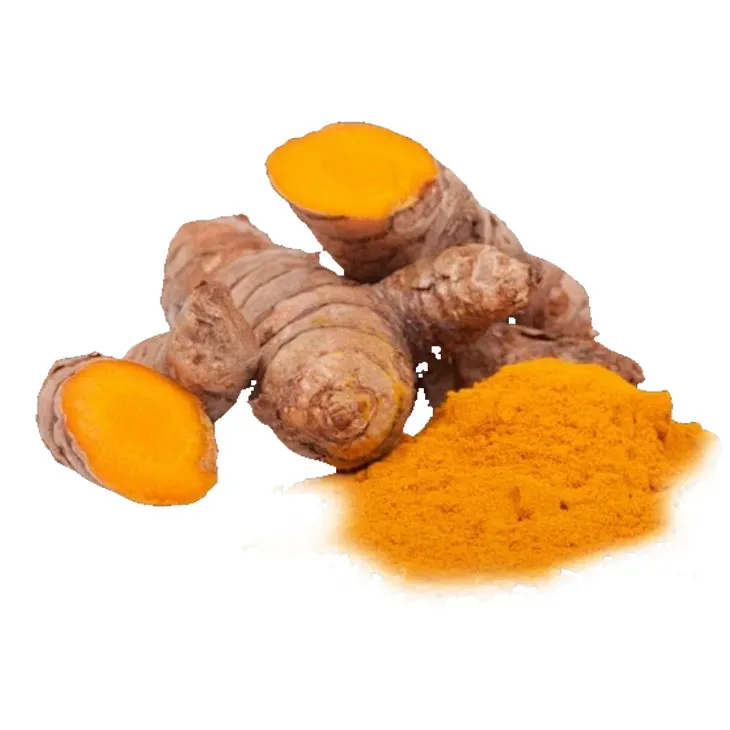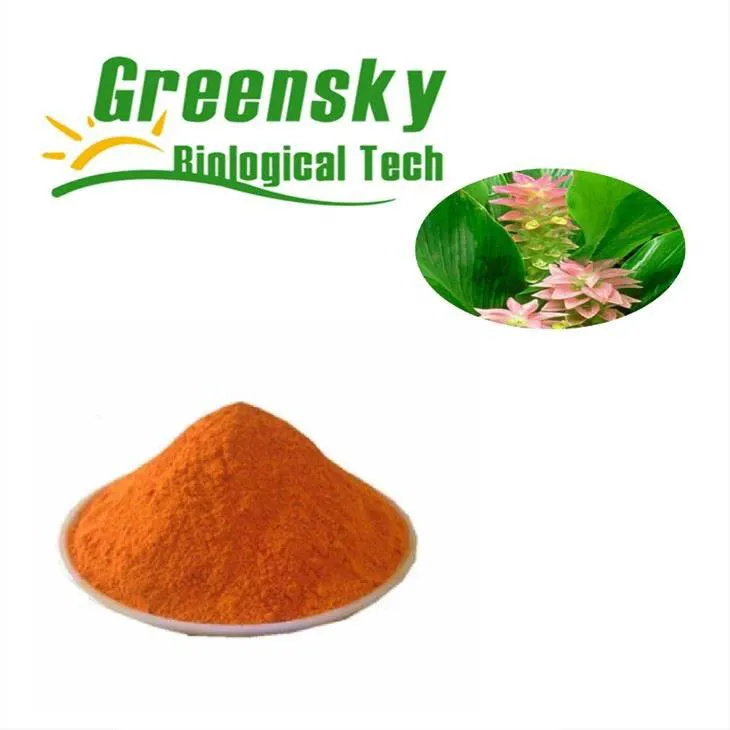- 0086-571-85302990
- sales@greenskybio.com
Five Efficacy of Curcumin + Dosage, Side Effects
2024-11-13

1. Introduction to Curcumin
Curcumin is a natural compound that is found in the spice turmeric. Turmeric has been used for centuries in traditional medicine, particularly in Ayurvedic and Chinese medicine. Curcumin is responsible for the bright yellow color of turmeric and has been the subject of extensive scientific research in recent years due to its potential health benefits.

2. The Five Amazing Benefits of Curcumin
2.1 Anti - Inflammatory Properties
One of the most well - known benefits of curcumin is its anti - inflammatory effects. Chronic inflammation is associated with a wide range of diseases, including arthritis, heart disease, and cancer. Curcumin has been shown to inhibit the activity of various inflammatory molecules in the body, such as cytokines and enzymes like cyclooxygenase - 2 (COX - 2). This can help reduce inflammation at the cellular level and potentially alleviate symptoms associated with inflammatory conditions. For example, in some studies on arthritis patients, curcumin supplementation has been associated with a reduction in joint pain and swelling.
2.2 Antioxidant Activity
Curcumin is a powerful antioxidant. Antioxidants are substances that can neutralize harmful free radicals in the body. Free radicals are unstable molecules that can cause damage to cells, DNA, and proteins, which can lead to aging and various diseases. Curcumin can scavenge free radicals and protect cells from oxidative stress. This antioxidant activity may contribute to its potential role in preventing chronic diseases such as cancer, neurodegenerative diseases (like Alzheimer's and Parkinson's), and cardiovascular diseases. In laboratory studies, curcumin has been shown to protect cells from oxidative damage caused by various toxins and environmental factors.
2.3 Potential Cancer - Preventive Effects
There is growing evidence suggesting that curcumin may have cancer - preventive properties. It can affect multiple pathways involved in cancer development and progression. For instance, curcumin has been shown to induce apoptosis (programmed cell death) in cancer cells, while leaving normal cells unharmed. It can also inhibit the growth and spread of cancer cells by interfering with signaling pathways that are involved in cell proliferation, angiogenesis (the formation of new blood vessels that supply tumors), and metastasis (the spread of cancer to other parts of the body). However, more research is needed to fully understand its potential as a cancer - preventive or - treatment agent, and it should not be considered a substitute for conventional cancer therapies at present.
2.4 Heart Health Benefits
Curcumin may also be beneficial for heart health. It can help improve lipid profiles by reducing levels of LDL (low - density lipoprotein, or "bad" cholesterol) and triglycerides, while increasing levels of HDL (high - density lipoprotein, or "good" cholesterol). Additionally, its anti - inflammatory and antioxidant properties can protect the blood vessels from damage and reduce the risk of atherosclerosis (the hardening and narrowing of the arteries). Some studies have also suggested that curcumin may help regulate blood pressure, although more research is required to confirm this effect in humans.
2.5 Brain Health and Neuroprotection
In relation to brain health, curcumin has shown promise. It can cross the blood - brain barrier, which is a significant advantage for substances that aim to have an impact on the brain. Curcumin may help prevent or slow down the progression of neurodegenerative diseases by reducing inflammation and oxidative stress in the brain. In animal studies, curcumin has been associated with improved cognitive function and a reduced risk of developing Alzheimer's - like symptoms. Some preliminary human studies also suggest that curcumin may have a positive effect on memory and cognitive performance, although more extensive research is needed.

3. Dosage of Curcumin
The appropriate dosage of curcumin can vary depending on several factors, including the intended use, an individual's health status, and the form of curcumin being used.
- For general health maintenance: A common dosage range is around 500 - 1000 mg per day. This can be taken in the form of a curcumin supplement or through consuming turmeric - rich foods. However, it should be noted that the bioavailability of curcumin from food sources is relatively low, so a larger amount of turmeric may need to be consumed to achieve a similar effect as with supplements.
- For specific health conditions: - In cases of arthritis, some studies have used dosages of up to 1500 - 2000 mg per day to help reduce inflammation and joint pain. - For potential cancer - preventive effects or as part of a complementary approach to cancer treatment, dosages may range from 1000 - 3000 mg per day, although this is still an area of active research and should be done under medical supervision.
It is important to note that curcumin supplements are available in different formulations, such as curcuminoids (which contain a mixture of curcumin and related compounds), and some may be combined with other substances to enhance bioavailability. When taking curcumin supplements, it is advisable to follow the manufacturer's instructions and consult a healthcare provider, especially if you are taking other medications or have underlying health conditions.

4. Side Effects of Curcumin
While curcumin is generally considered safe for most people when taken in appropriate amounts, there can be some potential side effects.
- Gastrointestinal Issues: Some people may experience mild digestive problems such as nausea, diarrhea, or abdominal discomfort. These side effects are more likely to occur when taking high doses of curcumin or when taking it on an empty stomach. To minimize these issues, it is often recommended to take curcumin with food.
- Allergic Reactions: Although rare, some individuals may be allergic to curcumin or turmeric. Allergic reactions can range from mild skin rashes to more severe symptoms such as difficulty breathing or swelling of the face, lips, or tongue. If you experience any signs of an allergic reaction after taking curcumin, discontinue use immediately and seek medical attention.
- Interactions with Medications: Curcumin may interact with certain medications. For example, it can enhance the effects of blood - thinning medications such as warfarin, increasing the risk of bleeding. It may also interact with medications for diabetes, as it can potentially lower blood sugar levels. If you are taking any medications, it is crucial to inform your healthcare provider before starting curcumin supplementation to avoid potential drug interactions.
In conclusion, curcumin has a wide range of potential health benefits, from anti - inflammatory and antioxidant effects to possible impacts on heart health, cancer prevention, and brain health. However, it is important to be aware of the appropriate dosage and potential side effects to ensure its safe and effective use.

FAQ:

What are the five main benefits of curcumin?
Curcumin has several benefits. Firstly, it has anti - inflammatory properties, which can help reduce inflammation in the body. Secondly, it may have antioxidant effects, combating free radicals. Thirdly, it could potentially improve heart health by reducing cholesterol levels. Fourthly, it might play a role in brain health, potentially reducing the risk of neurodegenerative diseases. Fifthly, it may have anti - cancer properties, though more research is needed in this area.
What is the recommended dosage of curcumin?
The recommended dosage of curcumin can vary depending on various factors such as the purpose of use and individual health conditions. For general health maintenance, a typical dosage might be around 500 - 1000 mg per day. However, for specific health issues, it is best to consult a healthcare professional. Some forms of curcumin are better absorbed, and in such cases, a lower dosage may be sufficient.
Are there any side effects of curcumin?
While curcumin is generally considered safe for most people, some possible side effects may occur. In high doses, it can cause gastrointestinal issues such as nausea, diarrhea, or indigestion. It may also interact with certain medications, so it is important to inform your doctor if you are taking curcumin supplements, especially if you are on medications for blood thinning, diabetes, or liver disease.
How does curcumin exert its anti - inflammatory effect?
Curcumin exerts its anti - inflammatory effect through multiple mechanisms. It can inhibit the activation of certain enzymes and transcription factors that are involved in the inflammatory response. For example, it can block the activation of NF - κB, which is a key regulator of inflammation - related genes. This helps to reduce the production of inflammatory mediators such as cytokines and prostaglandins, thereby reducing inflammation in the body.
Can curcumin be used for skin health?
Yes, curcumin can potentially be used for skin health. Its antioxidant and anti - inflammatory properties may be beneficial for various skin conditions. It may help reduce inflammation in skin disorders like psoriasis and acne. Additionally, it may protect the skin from damage caused by UV radiation due to its antioxidant effects, although more research is needed to fully understand its effectiveness in skin health applications.
Related literature
- The Bioactivity of Curcumin: A Review of Its Antioxidant, Anti - Inflammatory, and Anticancer Properties"
- "Curcumin: A Review of Its Effects on Human Health"
- "Dosage and Bioavailability of Curcumin in Health and Disease"
- ▶ Hesperidin
- ▶ Citrus Bioflavonoids
- ▶ Plant Extract
- ▶ lycopene
- ▶ Diosmin
- ▶ Grape seed extract
- ▶ Sea buckthorn Juice Powder
- ▶ Fruit Juice Powder
- ▶ Hops Extract
- ▶ Artichoke Extract
- ▶ Mushroom extract
- ▶ Astaxanthin
- ▶ Green Tea Extract
- ▶ Curcumin
- ▶ Horse Chestnut Extract
- ▶ Other Product
- ▶ Boswellia Serrata Extract
- ▶ Resveratrol
- ▶ Marigold Extract
- ▶ Grape Leaf Extract
- ▶ New Product
- ▶ Aminolevulinic acid
- ▶ Cranberry Extract
- ▶ Red Yeast Rice
- ▶ Red Wine Extract
-
Europen Bilberry Extract
2024-11-13
-
Black Pepper Extract
2024-11-13
-
Purple Sweet Potato Extract
2024-11-13
-
Peppermint Extract Powder
2024-11-13
-
Agaricus Blazei Extract
2024-11-13
-
Elderberry Extract
2024-11-13
-
Beetroot Powder
2024-11-13
-
Almond Extract Powder
2024-11-13
-
Dan Shen Root Extract/Salvia Root Extract
2024-11-13
-
White mustard seed extract
2024-11-13





















